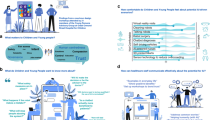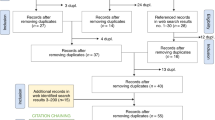Abstract
AI systems are becoming increasingly pervasive within children’s devices, apps and services. The concern over a world where AI systems are deployed unchecked has raised burning questions about the impact, governance and accountability of these technologies. Although recent effort on AI ethics has converged into growing consensus on a set of high-level ethical AI principles, engagement with children’s issues is still limited, and even less is known about how to effectively apply them in practice for children. This Perspective first maps the current global landscape of existing ethics guidelines for AI and analyses their correlation with children. We then critically assess the strategies and recommendations proposed by current AI ethics initiatives, identifying the critical challenges in translating such ethical AI principles into practice for children. Finally, we tentatively map out several suggestions regarding embedding ethics into the development and governance of AI for children.
This is a preview of subscription content, access via your institution
Access options
Access Nature and 54 other Nature Portfolio journals
Get Nature+, our best-value online-access subscription
$29.99 / 30 days
cancel any time
Subscribe to this journal
Receive 12 digital issues and online access to articles
$119.00 per year
only $9.92 per issue
Buy this article
- Purchase on Springer Link
- Instant access to full article PDF
Prices may be subject to local taxes which are calculated during checkout
Similar content being viewed by others
References
Li, J.-P. O. et al. Digital technology, tele-medicine and artificial intelligence in ophthalmology: a global perspective. Progr. Retin. Eye Res. 82, 100900 (2021).
Sims, A. et al. UNICEF Public Consultation on Draft Policy Guidance on AI for Children (UNICEF, 2022); https://www.unicef.org/globalinsight/media/2356/file/UNICEF-Global-Insight-policy-guidance-AI-children-2.0-2021.pdf
Strengers, Y., Kennedy, J., Arcari, P., Nicholls, L. & Gregg, M. Protection, productivity and pleasure in the smart home: emerging expectations and gendered insights from Australian early adopters. In Proc. 2019 CHI Conference on Human Factors in Computing Systems 645 (ACM, 2019).
Fadhil, A. & Villafiorita, A. An adaptive learning with gamification & conversational UIs: the rise of CiboPoliBot. In Adjunct Publication of the 25th Conference on User Modeling, Adaptation and Personalization 408–412 (ACM, 2017).
Kumaresamoorthy, N. & Firdhous, M. An approach of filtering the content of posts in social media. In 2018 3rd International Conference on Information Technology Research 1–6 (IEEE, 2018).
Corbett-Davies, S., Pierson, E., Feller, A., Goel, S. & Huq, A. Algorithmic decision making and the cost of fairness. In Proc. 23rd ACM SIGKDD International Conference on Knowledge Discovery and Data Mining 797–806 (ACM, 2017).
General Comment No. 25 (2021) on Children’s Rights in Relation to the Digital Environment (UNCRC, 2021); https://www.ohchr.org/en/documents/general-comments-and-recommendations/general-comment-no-25-2021-childrens-rights-relation
Age Appropriate Design Code (ICO, 2020); https://ico.org.uk/for-organisations/uk-gdpr-guidance-and-resources/childrens-information/childrens-code-guidance-and-resources/age-appropriate-design-a-code-of-practice-for-online-services/
Jobin, A., Ienca, M. & Vayena, E. The global landscape of AI ethics guidelines. Nat. Mach. Intell. 1, 389–399 (2019).
Leslie, D. Understanding artificial intelligence ethics and safety: A guide for the responsible design and implementation of AI systems in the public sector (The Alan Turing Institute, 2019).
Guidance for Regulation of Artificial Intelligence Applications (The White House, 2020); https://www.whitehouse.gov/wp-content/uploads/2020/11/M-21-06.pdf
Adams, C., Pente, P., Lemermeyer, G. & Rockwell, G. Artificial intelligence ethics guidelines for K-12 education: a review of the global landscape. In Artificial Intelligence in Education: 22nd International Conference Proceedings Part II, 24–28 (Springer, 2021).
Adams, C., Pente, P., Lemermeyer, G. & Rockwell, G. Ethical principles for artificial intelligence in K-12 education. Comput. Educ. 4, 100131 (2023).
Artificial Intelligence and Machine Learning (Internet Society, 2017); https://www.internetsociety.org/resources/doc/2017/artificial-intelligence-and-machine-learning-policy-paper/
Greene, D., Hoffmann, A. L. & Stark, L. Better, nicer, clearer, fairer: a critical assessment of the movement for ethical artificial intelligence and machine learning. In Proc. 52nd Hawaii International Conference on System Sciences (ed. Bui, T.) 2122–2131 (ScholarSpace, 2019).
McCradden, M. D., Joshi, S., Mazwi, M. & Anderson, J. A. Ethical limitations of algorithmic fairness solutions in health care machine learning. Lancet Digit. Health 2, e221–e223 (2020).
Proposal for a Regulation of the European Parliament and of the Council Laying Down Harmonised Rules on Artificial Intelligence (Artificial Intelligence Act) and Amending Certain Union Legislative Acts (European Commission, 2021); https://eur-lex.europa.eu/legal-content/EN/ALL/?uri=CELEX:52021PC0206
Touretzky, D., Gardner-McCune, C., Martin, F. & Seehorn, D. Envisioning AI for K-12: what should every child know about AI? In Proc. AAAI Conference on Artificial Intelligence Vol. 33, 9795–9799 (ACM, 2019).
Goralski, M. A. & Tan, T. K. Artificial intelligence and sustainable development. Int. J. Manage. Educ. 18, 100330 (2020).
Ethics and Governance of Artificial Intelligence for Health: Who Guidance (World Health Organization, 2021); https://www.who.int/publications/i/item/9789240029200
Roumate, F. in Ethics of Artificial Intelligence, Higher Education, and Scientific Research 129–144 (Springer). https://doi.org/10.1007/978-981-19-8641-3_10
Aayog, N. Discussion Paper: National Strategy for Artificial Intelligence (Government of India, 2018).
Gupta, M. & Sharma, A. Fear of missing out: a brief overview of origin, theoretical underpinnings and relationship with mental health. World J. Clin. Cases 9, 4881–4889 (2021).
Fjeld, J., Achten, N., Hilligoss, H., Nagy, A. & Srikumar, M. Principled Artificial Intelligence: Mapping Consensus in Ethical and Rights-Based Approaches to Principles for AI (Berkman Klein Center, 2020).
Lorenz, B., Kikkas, K. & Laanpere, M. Comparing children’s e-safety strategies with guidelines offered by adults. Electron. J. e-Learning 10, 326–338 (2012).
Online Safety Bill (UK Parliament, 2022); https://commonslibrary.parliament.uk/research-briefings/cbp-9579/
Child Rights By Design (5Rights Foundation, 2023); https://childrightsbydesign.digitalfuturescommission.org.uk/page/childrens-voices
Markopoulos, P., Read, J. C. & Giannakos, M. in Handbook of Human Factors and Ergonomics 1287–1304 (John Wiley & Sons, 2021).
Mittelstadt, B. Principles alone cannot guarantee ethical AI. Nat. Mach. Intell. 1, 501–507 (2019).
Prunkl, C. E. et al. Institutionalizing ethics in AI through broader impact requirements. Nat. Mach. Intell. 3, 104–110 (2021).
Wang, G., Zhao, J., Van Kleek, M. & Shadbolt, N. Informing age-appropriate AI: examining principles and practices of AI for children. In Proc. 2022 CHI Conference on Human Factors in Computing Systems 536 (ACM, 2022).
Fletcher, A. C. & Blair, B. L. Maternal authority regarding early adolescents’ social technology use. J. Family Iss. 35, 54–74 (2014).
Langford, R. Critiquing child-centred pedagogy to bring children and early childhood educators into the centre of a democratic pedagogy. Contemp. Issues Early Childh. 11, 113–127 (2010).
Wang, G., Zhao, J., Van Kleek, M. & Shadbolt, N. 12 ways to empower: designing for children’s digital autonomy. In Proc. 2023 CHI Conference on Human Factors in Computing Systems 91 (ACM, 2023).
Wang, G., Zhao, J., Van Kleek, M. & Shadbolt, N. ‘Treat me as your friend, not a number in your database’: co-designing with children to cope with datafication online. In Proc. 2023 CHI Conference on Human Factors in Computing Systems 95 (ACM, 2023).
Steen, M. Co-design as a process of joint inquiry and imagination. Des. Issues 29, 16–28 (2013).
Visram, S., Leyden, D., Annesley, O., Bappa, D. & Sebire, N. J. Engaging children and young people on the potential role of artificial intelligence in medicine. Pediatr. Res. 93, 440–444 (2023).
Thai, K. et al. Perspectives of youths on the ethical use of artificial intelligence in health care research and clinical care. JAMA Netw. Open 6, e2310659 (2023).
Druga, S., Yip, J., Preston, M. & Dillon, D. The 4As: Ask, Adapt, Author, Analyze—AI Literacy Framework for Families (MIT Press, 2021).
Lee, K. J. et al. The show must go on: a conceptual model of conducting synchronous participatory design with children online. In Proc. 2021 CHI Conference on Human Factors in Computing Systems 345 (ACM, 2021).
Woodward, J. et al. Using co-design to examine how children conceptualize intelligent interfaces. In Proc. 2018 CHI Conference on Human Factors in Computing Systems 575 (ACM, 2018).
Ekambaranathan, A., Zhao, J. & Van Kleek, M. “Money makes the world go around": identifying barriers to better privacy in children’s apps from developers’ perspectives. In Proc. 2021 CHI Conference on Human Factors in Computing Systems 46 (ACM, 2021).
Kop, M. EU Artificial Intelligence Act: The European Approach to AI (EU Artificial Intelligence Act, 2021).
MacCarthy, M. An Examination of the Algorithmic Accountability Act of 2019 (SSRN, 2019).
Zimmerman, J. & Forlizzi, J. in Ways of Knowing in HCI 167–189 (Springer, 2014).
Sandoval, W. Conjecture mapping: an approach to systematic educational design research. J. Learn. Sci. 23, 18–36 (2014).
Acknowledgements
This work was supported by the Ethical Web and Data Architectures project (grant number EWADA).
Author information
Authors and Affiliations
Contributions
G.W. conceptualized and wrote the manuscript. J.Z., M.V.K. and N.S. provided critical feedback. All authors read and approved the final manuscript.
Corresponding author
Ethics declarations
Competing interests
The authors declare no competing interests.
Peer review
Peer review information
Nature Machine Intelligence thanks Ryoko Asai and the other, anonymous, reviewer(s) for their contribution to the peer review of this work.
Additional information
Publisher’s note Springer Nature remains neutral with regard to jurisdictional claims in published maps and institutional affiliations.
Rights and permissions
Springer Nature or its licensor (e.g. a society or other partner) holds exclusive rights to this article under a publishing agreement with the author(s) or other rightsholder(s); author self-archiving of the accepted manuscript version of this article is solely governed by the terms of such publishing agreement and applicable law.
About this article
Cite this article
Wang, G., Zhao, J., Van Kleek, M. et al. Challenges and opportunities in translating ethical AI principles into practice for children. Nat Mach Intell 6, 265–270 (2024). https://doi.org/10.1038/s42256-024-00805-x
Received:
Accepted:
Published:
Issue Date:
DOI: https://doi.org/10.1038/s42256-024-00805-x



